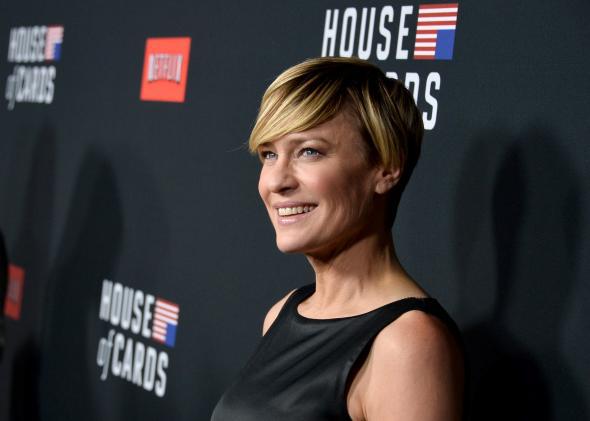The second season of House of Cards was released, in Netflix style, in its entirety on Friday, giving political junkies the whole three-day weekend to shotgun the complete season. It is still a soapy, addictive ride, but there’s been one prominent shift from the first 13 episodes.* Although those were criticized as sexist for featuring the ugly stereotype of the female journalist who sleeps with sources, the show has abruptly shifted into one of TV’s most feminist offerings. As with Orange Is the New Black, it seems Netflix is channeling its cult status into an opportunity to tell rich, honest stories about women’s lives without having to kowtow to the tender sensibilities of the conservatives in the audience. Warning: From here on out, this article will be stuffed with spoilers.
Consider the abortion storyline. Claire Underwood, the wife of the vice president who is played by Robin Wright, sits down for an exclusive interview with Ashleigh Banfield (played by herself). After Banfield annoyingly keeps asking Claire a bunch of questions about her childlessness, Claire finally admits one of the most forbidden things a woman in politics can admit: She’s had an abortion. She then saves the potentially disastrous interview by attributing the abortion to a rape she endured in college by a man who has now become a general. This skillfully shifts the discussion to the problem of rapists running free in the military.
Granted, Claire’s story isn’t exactly true. Yes, she’s had an abortion (three, it turns out), and yes, she was raped by this man. It’s just that none of her pregnancies were caused by this rape, and one of Claire’s abortions happened because she and her husband chose together not to have a baby. Claire is a character who is frequently portrayed as a scheming, immoral liar, but for once, her truth-fudging comes across as entirely sympathetic. The implication is that the American public will forgive aborting a rape-caused pregnancy but would never forgive someone who rebels against the expectation that she must have children with her husband. To protect herself from the intrusive condemnation of people she’s never met, she pretty much has to lie.
Interestingly, no anti-choicers protest or threaten Claire until after the tabloid press starts a rumor that she is an adulteress. This decision on the part of the show ends up driving home the idea that anti-abortion sentiment stems mainly from a desire to control female sexuality. Once the infidelity rumor gets out, Claire’s house is constantly bombarded; she’s even put under security lockdown because of the threats. Her confinement seriously cramps her ability to drum up support for an anti-rape bill that is working its way through Congress. In one scene, she’s meeting a fellow rape victim to discuss the bill, and they have to talk over the din from the protesters outside. The symbolism is striking: two women, trying to do something to stop violence against women, hemmed in by people who are singularly obsessed with exerting control. Sexual violence, bullying, and anti-choice ideology are presented as part of a whole cloth, a mass of injustice that women have to push back against. It’s an excellent rendering of how the war on women feels. And although Claire believes her side can win if they fight back, the season ends on a more ambivalent note: Perhaps the forces of sexism are just too overwhelming.
*Correction, Feb. 18, 2014: This post originally stated that the second season of House of Cards was released on Friday night. It was released on Friday morning.
